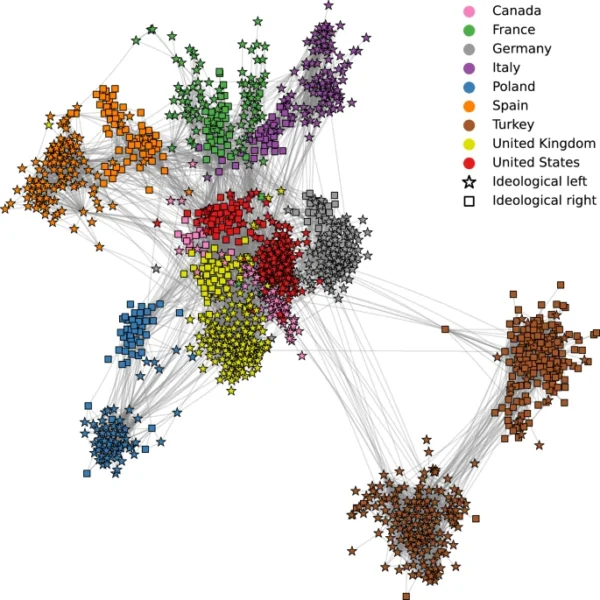Summary: New research analyzing 375 million tweets across nine countries found that political conversations follow similar patterns globally. The study reveals that interactions between opposing political groups are consistently more toxic but receive less engagement than discussions within political groups, suggesting a concerning trend in online political discourse.
Journal: Nature Communications, November 14, 2024, DOI: 10.1038/s41467-024-53868-0
Reading time: 4 minutes
A comprehensive study of social media platform X (formerly Twitter) has uncovered remarkably similar patterns in political discourse across different countries and languages. The research, published in Nature Communications, analyzed political interactions in nine countries including Canada, France, Germany, Italy, Poland, Spain, Turkey, the UK, and the USA.
Understanding Political Divides
The researchers examined 375 million tweets over a 24-hour period in September 2022, mapping the posts of users against over 1,800 politicians with active accounts. By tracking which users retweeted which politicians, they could determine users’ political leanings.
A key finding emerged: when people deviate from their party’s typical positions, they are quickly treated as political opponents. Notable examples include US politicians Liz Cheney and Tulsi Gabbard, who faced significant pushback after breaking from their respective parties’ stances.
The Cost of Cross-Party Communication
“Many of these trends may have worsened: Since Elon Musk’s takeover of Twitter, and the restrictions on data introduced, we no longer have access to the high quality data required to study these issues,” notes Dr. Max Falkenberg, lead author of the study.
The research revealed that while social media enables communication across political groups, these interactions are often hostile. Professor Andrea Baronchelli, who led the project, explains: “Our research reveals a key appeal of large platforms like X/Twitter: the chance to engage in aggressive exchanges with political opponents – unlike smaller platforms that simply allow conversations among like-minded users.”
Global Implications
This pattern spans across countries, suggesting a society where political opponents are viewed only as adversaries. The findings raise concerns about the impact on democratic discourse and the ability of different political groups to engage in constructive dialogue.
Glossary of Terms
- Affective Polarization: The tendency for people to view opposing political groups negatively
- Echo Chamber: An environment where people are exposed only to opinions that match their own
- Partisan: A strong supporter of a particular political party
- Political Discourse: Discussion of political ideas and issues
Test Your Knowledge
How many countries were included in the study?
Nine countries: Canada, France, Germany, Italy, Poland, Spain, Turkey, UK, and USA
What key behavioral pattern was observed across all countries?
Political party members who deviated from party positions were quickly treated as political opponents
How many tweets were analyzed in the study?
375 million tweets
What was found about cross-party communications?
They tend to be more hostile but receive less engagement than within-party communications
Enjoy this story? Get our newsletter! https://scienceblog.substack.com/


